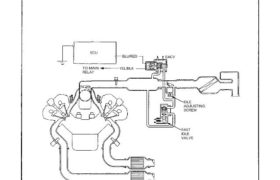The idle speed of the engine is controlled by the Electronic Air Control Valve (EACV).
The valve changes the amount of air bypassing into the intake manifold in response to electric current sent from the ECU.
When the EACV is activated, the valve opens to maintain the proper idle speed.
BLU/RED EACV
ECU
YEL/BLKTO MAIN
RELAY
IDLE
ADJUSTING
SCREW
FAST
IDLE
VALVE
(cont’d)
Idle Control System
System Description (cont’d)
1. After the engine starts, the EACV opens for a certain time. The amount of air is increased to raise the idle speed about 150
-300 rpm.
2. When the coolant temperature is low, the EACV is opened to obtain the proper fast idle speed. The amount of bypassed air
is thus controlled in relation to the coolant temperature.
ENGINE SPEED
(rpm)
COOLANT TEMPERATURE
(°C)
1. When the idle speed is out of specification and the Check Engine light does not blink CODE 14, check the following
items:
Adjust the idle speed (page 11- 84)
Air conditioning signal (page 11-72)
Alternator FR signal (page 11-74)
A/T shift position signal (page 11-76)
M/T neutral switch signal (page 11-78)
M/T clutch switch signal (page 11- 80)
Starter switch signal (page 11- 82)
Fast idle valve (page 11- 83)
Hoses and connections
EACV and its mounting O-rings
2. If the above items are normal, substitute a known-good EACV and readjust the idle speed (page 11- 84).
If the idle speed still cannot be adjusted to specification (and the Check Engine light does not blink CODE 14) after
EACV replacement, substitute a known-good ECU and recheck. If symptom goes away, replace the original ECU.
